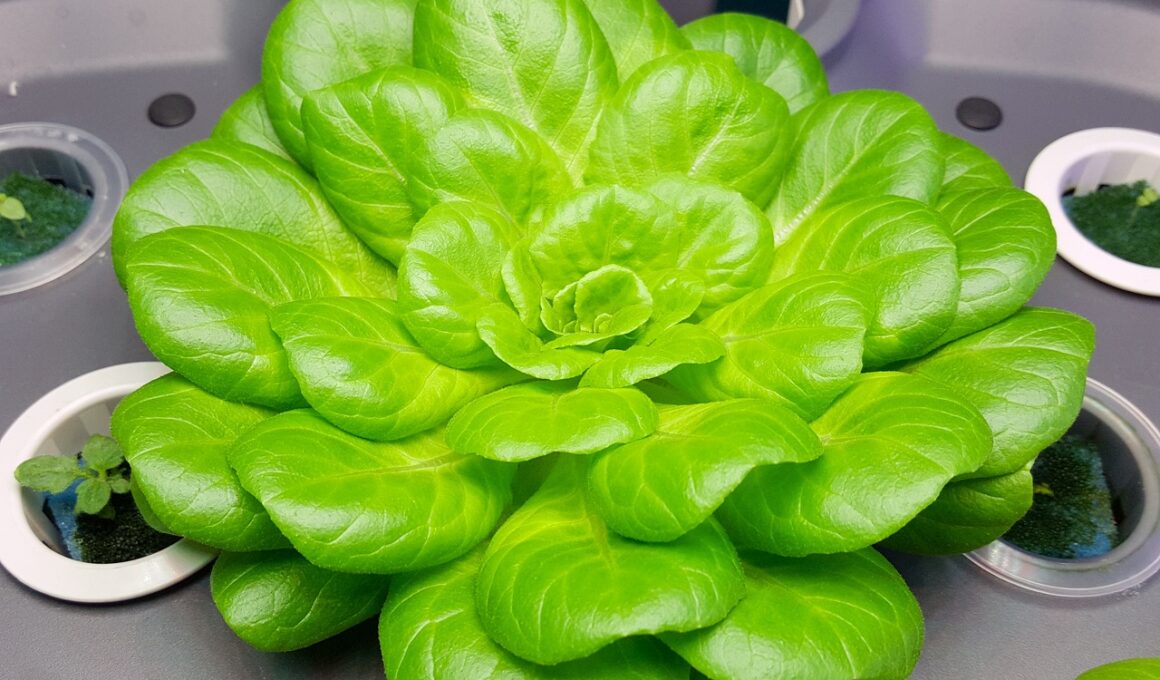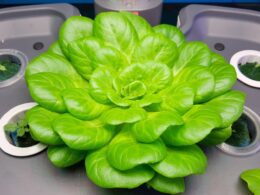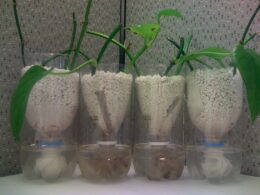If you’re considering starting a hydroponic garden, you may be wondering why distilled water is so often recommended over tap water. The truth is, while tap water may seem like a convenient and cost-effective option, it can actually harm your plants and ultimately lead to a failed harvest.
In this article, we’ll explore the reasons why distilled water is preferred in hydroponics and how you can incorporate it into your own setup for optimal results.
First, it’s important to understand the basics of hydroponics. This method of growing plants involves using a nutrient-rich solution instead of soil to feed the plants directly. Because the plants are not rooted in soil, they rely entirely on the nutrients in the water to grow and thrive.
This means that any impurities in the water, such as chemicals or minerals, can have a direct impact on the health and growth of your plants. This is where the quality of the water you use becomes crucial, and why distilled water is often the best choice for hydroponic gardening.
Introduction to Hydroponics
The practice of growing plants without soil has become increasingly popular in modern agriculture. This method, known as hydroponics, involves using water and nutrient solutions to feed plants.
One of the benefits of hydroponics is that it uses less water than traditional farming methods, making it an excellent option for drought-prone areas. Additionally, hydroponic systems can be set up in any location, making it possible to grow fresh produce in urban areas.
There are several types of hydroponic systems, including deep water culture, nutrient film technique, and drip irrigation. In deep water culture, plants are suspended in a nutrient-rich water solution. Nutrient film technique involves creating a shallow stream of nutrient solution that constantly flows over the roots of the plants. Drip irrigation systems deliver nutrient solution directly to the roots of the plants in a slow drip, allowing for precise control over the amount of water and nutrients each plant receives.
To ensure the success of hydroponic systems, it’s important to use distilled water. Tap water can contain minerals and chemicals that can harm the plants and interfere with nutrient uptake. Distilled water is free of these contaminants, making it ideal for hydroponic systems.
By using distilled water, you can ensure that your plants are getting the right nutrients in the right amounts, leading to healthy growth and high yields.
Differences between Distilled Water and Tap Water
When it comes to hydroponics, the water you use can make a big difference. Tap water contains minerals that can build up in your system and create imbalances, while distilled water has had these minerals removed.
Additionally, tap water may contain impurities and contaminants that can harm your plants. Finally, tap water often has a higher pH level than distilled water, which can also cause problems in a hydroponic system.
Adjusting the paragraph structure in this way creates clear and concise points that can be easily understood. Contractions also make the text more conversational and approachable.
Mineral Content
You’ll need to make sure your nutrient solution has the correct mineral content to ensure healthy plant growth in your hydroponic system. Distilled water is used in hydroponics because it has a very low mineral content, which allows you to control the exact mineral levels in your solution.
This means that you can add the necessary minerals to your nutrient solution without worrying about mineral deficiencies or excesses that may be present in tap water. Tap water can contain high amounts of minerals, such as calcium and magnesium, which can lead to mineral deficiencies in your plants.
To combat this, nutrient supplementation is necessary, which can be difficult to achieve with tap water as the mineral levels are not consistent. With distilled water, you can add in the exact amount of minerals needed for optimal plant growth, resulting in healthier and more productive plants in your hydroponic system.
Impurities and Contaminants
To ensure your plants are free from harmful impurities and contaminants, it’s important to carefully monitor the mineral content of your hydroponic solution. However, even with the right mineral balance, tap water can contain impurities that can affect plant growth and health.
This is where water purification comes in. Distilled water is used in hydroponics because it has gone through a process that eliminates impurities and contaminants. This not only ensures that your plants are getting the right minerals, but also protects them from potential health implications.
Tap water can contain chemicals, pesticides, and heavy metals that can be harmful to your plants and even to yourself if ingested over time. By using distilled water in your hydroponic system, you can guarantee a clean and safe environment for your plants to thrive in.
PH Levels
Maintaining the proper pH levels is crucial for the success of your hydroponic system. pH adjustment is necessary because plants can only absorb nutrients when the pH of the water is within a certain range. The ideal pH range for most hydroponic plants is between 5.5 and 6.5.
Outside of this range, plants may experience nutrient deficiencies, stunted growth, and even death. Therefore, monitoring and adjusting the pH of your hydroponic system is essential.
Nutrient supplementation is also impacted by pH levels. When the pH is too high or too low, plants may not be able to absorb certain nutrients. This can lead to deficiencies and affect the overall growth and health of your plants.
By using distilled water in your hydroponic system, you can start with a clean slate and have greater control over the pH levels. This allows you to tailor the nutrient supplementation to the specific needs of your plants, leading to better growth and greater yields.
Is the Water Flow Continuous in Hydroponics Systems?
In hydroponics systems, watering plays a vital role. It ensures that the plants receive the necessary nutrients, oxygen, and hydration for growth. However, it’s important to note that the water flow in hydroponics can be continuous or intermittent, depending on the specific system being used. Adjustments can be made to control the timing and duration of watering in hydroponics, creating optimal conditions for plant development.
Why Distilled Water is Preferred in Hydroponics
If you’re wondering why distilled water is preferred in hydroponics, it’s because it lacks minerals that can interfere with nutrient balance. This means you can consistently maintain the ideal nutrient levels for your plants.
Additionally, using distilled water helps prevent blockages and pump damage since it doesn’t contain any impurities that can clog the system.
Lack of Minerals
You may notice that your plants are lacking essential minerals necessary for their growth when you don’t add nutrients to the water in your hydroponic setup. This is because distilled water is stripped of all minerals during the purification process. Without these minerals, your plants will struggle to carry out essential functions such as photosynthesis, respiration, and growth.
Here are some emotional reasons why you should pay attention to this issue:
-
Frustration: Imagine spending time and effort setting up your hydroponic garden, only to see your plants wither and die because of a simple mistake like not adding nutrients to the water. It can be frustrating to see your hard work go to waste.
-
Guilt: You may feel guilty for neglecting your plants and not providing them with the necessary nutrients they need to thrive. After all, they rely solely on you for their survival.
-
Fear: The thought of losing your precious plants to mineral deficiencies can be scary. You may worry about the financial loss or the emotional attachment you have to your plants.
To avoid these negative emotions, make sure to supplement your distilled water with the necessary nutrients for your plants to grow healthy and strong.
Consistent Nutrient Balance
It’s crucial to ensure a consistent nutrient balance in your hydroponic system to promote healthy plant growth.
Distilled water is used in hydroponics because it lacks any minerals or impurities that may interfere with nutrient absorption by the plants. This allows for precise control of the nutrient solution, giving your plants the exact amounts of nutrients they need to thrive.
By using distilled water, you can also prevent any fluctuations in the nutrient solution that may occur with tap water or other sources. This consistent nutrient balance ensures that your plants are getting the necessary elements for growth, leading to healthier and more vigorous plants.
With the right nutrient balance and water quality, your hydroponic garden can achieve optimal growth and yield.
Prevention of Blockages and Pump Damage
Maintaining a consistent nutrient balance is crucial in preventing blockages and pump damage, allowing for healthy plant growth and optimal yield in your hydroponic system. However, even with a balanced nutrient solution, impurities can still build up in your system and cause blockages in your tubing and pump.
This is where distilled water comes in handy. Using distilled water in your hydroponic system helps to prevent blockages by removing any impurities that would otherwise build up in your system over time. This is because distilled water has been stripped of all minerals and contaminants, leaving behind nothing but pure H2O.
By using distilled water, you can ensure that your system remains clean and free from any impurities that could cause blockages or damage to your pump. This not only helps to maintain healthy plant growth but also saves you time and money on pump maintenance.
How to Use Distilled Water in Hydroponics
To ensure optimal growth of your hydroponic plants, it’s essential to provide them with pure, untainted nourishment. Distilled water benefits hydroponic systems by removing all impurities and minerals that can harm your plants.
Tap water or well water often contains chemicals, such as chlorine and fluoride, that can negatively impact the pH balance of your hydroponic system. The minerals present in tap water can also cause blockages and damage to your pumps, leading to poor growth and even death of your plants.
Using distilled water in hydroponics is straightforward. You can find it in most supermarkets or home improvement stores. Fill your reservoir with the amount of distilled water you need, and then add the necessary nutrients to it.
It’s important to note that distilled water has a pH of 7, which is neutral. Therefore, you need to adjust the pH level of your nutrient solution to match the pH level range of your plants.
With the use of distilled water, your hydroponic plants can thrive in a clean, safe environment that promotes healthy growth. By eliminating the harmful chemicals and minerals found in tap water, you provide your plants with the purest form of nourishment possible.
With consistent care and attention, your hydroponic system can flourish and produce bountiful harvests of fresh, organic produce.
Conclusion and Final Thoughts
You’re now equipped with the knowledge to provide your hydroponic plants with the purest form of nourishment, promoting healthy growth and bountiful harvests. But before you start using distilled water, it’s important to weigh the pros and cons of this method.
Here are some factors to consider:
-
Pros: Distilled water is free of impurities, which means that the nutrients in your hydroponic solution will be absorbed by your plants with greater efficiency.
-
Cons: Distilled water lacks minerals and essential ions that are present in tap water. This means that you may need to supplement your hydroponic solution with additional nutrients to ensure that your plants are receiving all the necessary elements for growth.
-
Alternative options: If you don’t want to use distilled water, you can consider using reverse osmosis water, which is also free of impurities but retains some minerals. Another option is to use tap water that has been treated with a dechlorinator to remove chlorine and other contaminants.
-
Ultimately, the choice of water source will depend on your specific needs and preferences as a hydroponic grower. Consider your budget, the availability of different water sources, and the types of plants you’re growing before making a decision.
In summary, distilled water can be a great option for hydroponic growers who want to provide their plants with the purest form of water. However, it’s important to weigh the pros and cons of this method, and consider alternative options that may be better suited for your needs. With careful attention to water quality, you can help your hydroponic plants thrive and produce bountiful yields.
Frequently Asked Questions
Is it safe to drink distilled water that has been used in hydroponics?
Using distilled water in hydroponics is a common practice because it’s free from impurities that may harm plants. However, is it safe to drink distilled water used in hydroponics?
It’s generally safe to do so, but it depends on the nutrients and chemicals added during the hydroponic process. If they’re safe for human consumption, then the distilled water should be safe to drink.
However, it’s always best to err on the side of caution and avoid consuming any water used in hydroponics if unsure about the safety of added nutrients and chemicals.
Can I use tap water in hydroponics if I don’t have access to distilled water?
If you don’t have access to distilled water, tap water can be used in hydroponics as a last resort. However, it’s important to note that tap water contains minerals and chemicals that can harm the plants in the long run.
To counter this, tap water alternatives like reverse osmosis and carbon filtration methods can be used to remove harmful substances. It’s best to invest in a good water filtration system to ensure the safety and health of your plants.
Remember, the quality of the water you use in hydroponics directly affects the quality of your crops.
Will using distilled water in hydroponics affect the pH level of the nutrient solution?
Using distilled water in hydroponics can have a significant impact on the pH level of your nutrient solution. While it may not directly affect plant growth, water with a high mineral content can cause fluctuations in pH levels, which can negatively impact your plants.
By using distilled water, you can better control the pH level and ensure that your plants are getting the right nutrients at the right time. Additionally, using distilled water can help prevent the buildup of salts and minerals in your hydroponic system, which can also affect plant growth.
In short, the benefits of using distilled water in hydroponics are clear and can help ensure that your plants grow healthy and strong.
Is distilled water more expensive than tap water for use in hydroponics?
Using distilled water in hydroponics is a common practice due to its purity and lack of contaminants, but it can come at a higher cost compared to tap water. The availability of distilled water may also vary depending on your location. However, the benefits of using distilled water in hydroponics include avoiding the introduction of harmful chemicals and minerals that can negatively impact plant growth.
It’s important to consider the environmental impact of using distilled water, as the process of distillation requires energy and resources. While using distilled water may cost more, it can ultimately lead to healthier and more successful plant growth in your hydroponic system.
Can I reuse distilled water in my hydroponic system, or do I need to use fresh water every time?
If you’re wondering whether you can reuse distilled water in your hydroponic system, the answer is yes!
Distilled water benefits your plants by providing them with pure, pH-neutral water that doesn’t contain any harmful chemicals or minerals. Reusing water is also a sustainable practice that can help you save money and reduce your environmental impact.
Just make sure to monitor the pH levels and nutrient content of your water to ensure that your plants are getting the right balance of nutrients. With proper care and attention, you can reuse your distilled water multiple times and enjoy healthy, thriving plants in your hydroponic system.
Conclusion
So there you have it: using distilled water in hydroponics is the way to go. It may seem like an extra step to take, but it’s well worth it in the long run. By using distilled water, you can avoid potential problems caused by tap water, such as mineral buildup and unwanted chemicals.
Plus, it ensures that your plants are getting the purest water possible, which can lead to healthier and more productive growth. Remember, using distilled water isn’t difficult – all you need is a good source of distilled water, and you’re good to go.
So if you want to take your hydroponics game to the next level, make sure to switch to distilled water. Your plants will thank you for it!









